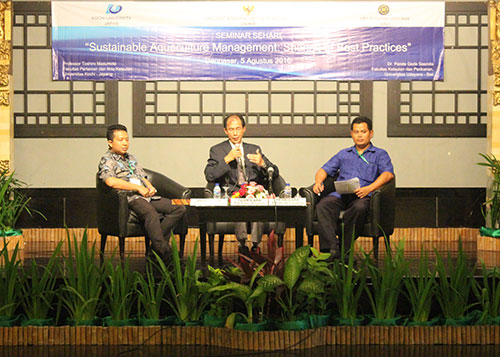One Day Seminar on the Management of Marine Source Sustainable aquaculture management: Sharing of best practices
On Friday, 5th of August 2016, located in Sanur Paradise Hotel, were held a one day seminar entitled The Management of Marine Source, Sustainable Aquaculture Management: Sharing of Best Practices. This seminar has the collaboration with the General Consulate of Indonesian Republic (KJRI) in Osaka, Jepang, Faculty of Marine and Fisheries, Udayana University (Bali) and Kochi University (Jepang).

The purpose of this seminar is as a means of sharing the results of research and experience between aquaculture experts from Indonesia and Japan to improve the knowledge and understanding the overcome various obstacles and increase production in the aquaculture field, but still pay attention to the principles of sustainable aquaculture or sustainable farming. In addition, this seminar can be an initiation of cooperation in order to improve human resources and technology between stakeholders and academics / practitioners of Indonesia-Japan or among stakeholders in Indonesia. The seminar was attended by about 90 participants from academia, government agencies, research centers, the set of fishermen, fisheries practitioners and NGOs coming from inside and outside the province of Bali.

This seminar presents two speakers who are experts on the field of aquaculture, namely Prof. Toshiro Masumoto (Faculty of Agriculture and Marine Science, Kochi University) and Dr. Pande Gde Sasmita (Water Resource Management Studies Program, Faculty of Marine and Fisheries, University of Udayana). The topic of the presentation from Prof. Masumoto is divided into four sub-topic, which is the development of added value to fishery products, effective use of the leftover food and farming systems are integrated. The second speaker discusses the inhibition of pathogenic bacteria cell communication (quorum sensing) as an alternative to the use of antibiotics that are very commonly used in shrimp farming. Exposure results of research and experience by the two speakers to the conclusion that the sustainability of aquaculture is determined by the balance between water quality management, nutrition and disease. Some methods are presented, among others, the use of macroalgae (seaweed) as a filter to keep the water quality and the use of certain chemical compounds to inhibit the activity of pathogenic bacteria that can minimize the use of antibiotics. The accumulation of the residues of antibiotics can damage multiple organs in humans that the final consumen of aquaculture products.

(mimi)









